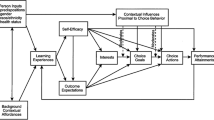Abstract
The aim of this research project is to investigate the low retention rate among the foundation and first year undergraduate students from the School of Computing and Digital Media in a London based university. Specifically, the research is conducted during the Covid-19 pandemic using learned optimism as a lens. The research will aid the university to improve retention rate as the overall dropout has been increasing in the last few years. The current study employed an exploratory investigation approach by using statistical modelling analysis in R to predict behavioural patterns. The quantitative data analysis conducted aims to support the efforts of the School of Computing and Digital Media of a London based university to re-evaluate its retention strategies in foundation and first year computing students. The main outcome of the analysis is that students with a foreign qualification are optimistic, while students with other or not known qualification are mildly pessimistic. In addition, students with a BTECH, Higher Education diploma or A level qualification are generally more pessimistic especially if they are also black ethnicity, or if are not black ethnicity, then aged under 34 and British.
Access this chapter
Tax calculation will be finalised at checkout
Purchases are for personal use only
Similar content being viewed by others
References
Andrews, J., Clark, R., Thomas, L.: Compendium of effective practice in higher education retention and success (2012). https://s3.eu-west-2.amazonaws.com/assets.creode.advancehe-document-manager/documents/hea/private/what_works_compendium_effective_practice_1568036670.pdf. Accessed 10 Apr 2021
Apuke, O.: Quantitative research methods: a synopsis approach. Kuwait Chap. Arab. J. Bus. Manage. Rev. 6(11), 40–47 (2017)
McLaughlin, E.: What is data collection? - Definition from WhatIs.com. SearchCIO, https://searchcio.techtarget.com/definition/data-collection. Accessed 28 July 2021
Armstrong, C.: What is a University in the UK?. https://web.archive.org/web/20100513000141/http://www.jobs.ac.uk/careers/articles/1135/what-is-a-university-in-the-uk/. Accessed 20 July 2021
Behrens, J.: Principles and procedures of exploratory data analysis. Psychol. Methods 2(2), 131–160 (1997)
Bennett, R.: Unconditional offers blamed for increase in students dropping out of university, https://www.thetimes.co.uk/article/unconditional-offers-blamed-for-increase-in-students-dropping-out-of-university-7zdmst86w. Accessed 20 June 2021
Bermingham, J.: Non-continuation: UK Performance Indicators. HESA. https://www.hesa.ac.uk/data-and-analysis/performance-indicators/non-continuation. Accessed 08 Apr 2021
Bhatia, M.: A Complete Guide to Quantitative Research Methods – Atlan. Humans of Data. https://humansofdata.atlan.com/2018/06/quantitative-research-methods/. Accessed 27 June 2021
Boykin, R.B.: Integrating positive psychology techniques into rehabilitation counsellor education. Rehabil. Educ. 24(1), 25–34 (2010)
Diversity Abroad, Partners. https://www.diversityabroad.com/partners/london-metropolitan-university. Accessed 27 June 2021
Elliot Major, L., Eyles, A., Machin, S.: Generation COVID: Emerging work and education inequalities. https://cep.lse.ac.uk/pubs/download/cepcovid-19-011.pdf. Accessed 20 July 2021
Davis, A., Jarvis, S.: Why are UK students the most stressed over studying maths?. https://patient.info/news-and-features/why-are-uk-students-the-most-stressed-over-studying-maths. Accessed 18 Feb 2022
Dickinson, J.: The costs of Covid restrictions on students are social. https://wonkhe.com/blogs/anti-social-learning-the-costs-of-covid-restrictions-on-students. Accessed 28 July 2021
Explore-education-statistics.service.gov.uk, Participation measures in higher education. https://explore-education-statistics.service.gov.uk/find-statistics/participation-measures-in-higher-education/2018-19#releaseHeadlines-tables. Accessed 08 Apr 2021
Fazackerley, A.: UK universities predict record student dropout rate. https://www.theguardian.com/education/2020/sep/19/uk-universities-predict-record-student-dropout-rate. Accessed 22 June 2021
Hesa.ac.uk, Definitions: Students HESA. https://www.hesa.ac.uk/support/definitions/students#qualifications-obtained-population. Accessed 28 July 2021
Hewitt, R.: Students’ views on the impact of Coronavirus on their higher education experience in 2020/21. https://www.hepi.ac.uk/wp-content/uploads/2020/12/HEPI-Policy-Note-27-Students-views-on-the-impact-of-Coronavirus-on-their-higher-education-experience-in-2020-21-FINAL.pdf. Accessed 20 July 2021
Jovancic, N.: Data Collection Methods for Obtaining Quantitative and Qualitative Data. https://www.leadquizzes.com/blog/data-collection-methods. Accessed 26 July 2021
Farrell, S.: Open-Ended vs. Closed-Ended Questions in User Research. https://www.nngroup.com/articles/open-ended-questions. Accessed 27 July 2021
McLeod, S.: The Interview Research Method. https://www.simplypsychology.org/interviews.html. Accessed 27 July 2021
Bryman, A., Liao, T., Lewis-Beck, M.: The SAGE Encyclopaedia of Social Science Research Methods. SAGE Publications, Incorporated, Thousand Oaks (2004)
Kemp, P., Berry, M., Wong, B.: The Roehampton Annual Computing Education Report: Data from 2017. London: University of Roehampton: University of Roehampton (2018)
Khan, S.: Skills for Londoners. London: Greater London Authority. https://www.london.gov.uk/sites/default/files/sfl_strategy_final_june_20186.pdf. Accessed 10 Apr 2021
Hunter, J.: National Student Survey 2021: overall satisfaction results show varied impact of Covid-19. https://www.timeshighereducation.com/student/news/national-student-survey-2021-overall-satisfaction-results-show-varied-impact-covid-19. Accessed 04 Jan 2022
Clark, L.A., Pergibon, D.: Statistical models. In: Chambers, S.J.M., Hastie, T.J., (eds.) chapter Tree-Based Models, Chapman & Hall, New York, pp. 377- 419 (1993)
Mantle, R.: Non-continuation: UK Performance Indicators 2017/18 HESA. https://www.hesa.ac.uk/news/07-03-2019/non-continuation-tables. Accessed 16 June 2021
Marshall, P.: On course for success? Student retention at university. https://www.smf.co.uk/wp-content/uploads/2017/07/UPP-final-report.pdf. Accessed 21 June 2021
McDonald, C.: Interview: Equality starts with education, says Salesforce.org. https://www.computerweekly.com/news/450424453/Interview-Equality-starts-with-education-says-Salesforceorg-exec. Accessed 22 June 2021
McDonald, C.: Computing curriculum shake-up can’t happen in a single five-year parliamentary term, says panel. https://www.computerweekly.com/news/252441849/Computing-curriculum-shake-up-cant-happen-in-a-single-five-year-parliamentary-term-says-panel. Accessed 25 June 2021
nhs.uk, Overview - Cognitive behavioural therapy (CBT). https://www.nhs.uk/mental-health/talking-therapies-medicine-treatments/talking-therapies-and-counselling/cognitive-behavioural-therapy-cbt/overview/. Accessed 12 Apr 2021
Peterson, C.: The future of optimism. Am. Psychol. 55, 44–55 (2000)
Petrie, K., Keohane, N.: On course for success? Student retention at university, https://www.smf.co.uk/publications/course-success-student-retention-university. Accessed 08 Apr 2021
Petrie, K., Keohane, N.: Building on success. https://www.smf.co.uk/wp-content/uploads/2019/04/Building-on-Success.pdf. Accessed 15 June 2021
Richards, K., Pilcher, N.: Study Skills: neoliberalism’s perfect Tinkerbell. Teaching in Higher Education, 1–17 (2020)
Seligman, M.: Learned optimism. Penguin Random House Australia (1998)
Seligman, M.: Authentic Happiness. Free Press, New York (2002)
Shamoo, A.E., Resnik, B.R.: Responsible Conduct of Research. Oxford University Press (2003)
Study-UK British Council, A higher standard of education. https://study-uk.britishcouncil.org/why-study/higher-standard-education. Accessed 21 June 2021
Times Higher Education. https://www.timeshighereducation.com/world-university-rankings/2021/world-ranking. Accessed 08 Apr 2021
Weale, S.: Maths anxiety’ causing fear and despair in children as young as six. https://www.theguardian.com/education/2019/mar/14/maths-anxiety-causing-fear-and-despair-in-children-as-young-as-six. Accessed 18 Feb 2022
Wonkhe, Non-continuation research. https://wonkhe.com/wp-content/wonkhe-uploads/2020/11/Non-continuation-research-November-2020.pdf. Accessed 02 July 2021
Yang, L., Liu, S., Tsoka, S., Papageorgiou, L.G.: A regression tree approach using mathematical programming. Expert Syst. Appl. 78, 347–357 (2017)
Author information
Authors and Affiliations
Corresponding author
Editor information
Editors and Affiliations
Rights and permissions
Copyright information
© 2023 The Author(s), under exclusive license to Springer Nature Switzerland AG
About this paper
Cite this paper
Chrysikos, A., Ravi, I., Stasinopoulos, D., Rigby, R., Catterall, S. (2023). Retention of Computing Students in a London-Based University During the Covid-19 Pandemic Using Learned Optimism as a Lens: A Statistical Analysis in R. In: Arai, K. (eds) Intelligent Computing. SAI 2023. Lecture Notes in Networks and Systems, vol 711. Springer, Cham. https://doi.org/10.1007/978-3-031-37717-4_16
Download citation
DOI: https://doi.org/10.1007/978-3-031-37717-4_16
Published:
Publisher Name: Springer, Cham
Print ISBN: 978-3-031-37716-7
Online ISBN: 978-3-031-37717-4
eBook Packages: Intelligent Technologies and RoboticsIntelligent Technologies and Robotics (R0)




